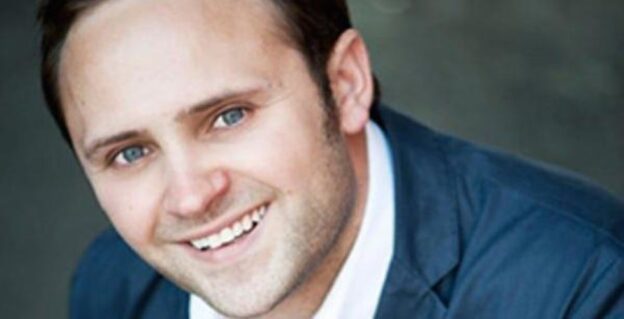[1/2] Daniel Burt is a journalist, comedy writer and performer from Melbourne, Australia. He writes for two big newspapers in Australia, he worked as an intern at Late Night with David Letterman, he has his own page on Wikipedia and in his work he has interviewed Matt Smith, David Tennant, Benedict Cumberbatch and Martin Freeman, which means he has met 2 Doctor Whos Sherlock Holmes, Dr Watson and The Hobbit! Wow. In this episode you can listen to us talking about diverse topics such as Australia’s relationship to The Queen & The Commonwealth, his work as an entertainment journalist, his time living in New York, the David Letterman show, Will Smith, show business, and zombies…
Download Episode 
I’m very pleased to have Daniel on the podcast for a number of reasons:
a) He is a bright, witty guy with lots of things to say, and he can talk the hind legs off a donkey (not literally, that’s just an idiom which means he can talk and talk!)
b) He is from Australia, so you can listen to his genuine Aussie accent and hear some authentic Australian English.
c) He has met Sherlock Holmes, Bilbo Baggins, Doctor Who and others.
Daniel is noteworthy enough to have his own page on Wikipedia. Click here to read it.
Daniel is a writer so naturally uses a lot of colourful language, descriptive vocabulary and idiomatic expressions. He also speaks pretty quickly in an accent that you might not be familiar with so listen closely. A transcript should arrive before too long but if you have any questions about words or phrases from this episode, please leave them in the comments section, with a time-code. ;)
This is a two part podcast. In part 1, this one, Daniel and I talk about these things:
The Zombie Apocalype
– Is my apartment safe?
– Would Daniel survive a zombie attack? Is he too complacent?
– Are people who like zombies all loners?
– Is Luke a loner?
Daniel’s Coin-dropping Habits
– Why can’t Daniel hold onto coins when shop assistants give him change?
– Why does he always drop coins onto the floor?
– Is it because Australian notes are so shiny and slippery, that the coins just slide off?
– Or is it just because he is socially awkward or nervous for some reason?
The Queen on Australian money
– How does Daniel feel about it?
– What’s the role of The Queen in Australian life?
– Will Australia leave the commonwealth and become fully independent?
Daniel’s work as an entertainment journalist
– Does he really have a Wikipedia page about him?
– What was it like living in New York?
– What was it like working for David Letterman?
Seeing Will Smith in the audience at a Parisian cabaret show
– Did he enjoy the show?
– What was the audience’s reaction to seeing Will Smith in the crowd?
– Did it affect the performance?
– What are the secrets of show business?
-And what does “getting jiggy with it” actually mean?
I’ve divided this into two episodes. So, stay tuned for details about his meeting with Sherlock Holmes, The Hobbit and Doctor Who in part 2.
Our conversation begins pretty quickly after we’d already been talking for about half an hour before turning on the microphone. Let me give you some context so you can hit the ground running.
Before turning on the microphone, we were talking about some of our favourite TV shows. I mentioned that I watch The Walking Dead, which is a show about zombies. I like zombies and that kind of thing, I’m sick and twisted in that way. Daniel doesn’t watch the show, and he isn’t a big zombie fan. He said he thought you’d need to be a bit of an idiot to get bitten by a zombie, because they’re so slow. Surely you’d see the zombie coming, and you’d just get out of the way, quite casually. I disagreed, and explained that getting bitten by a walker is easier than you might expect. Zombies might seem slow, but if you get complacent – over confident and too relaxed, that’s when you might be caught by surprise. If a zombie is walking towards you, he’s pretty slow so you might think you’re safe, but they’re unpredictable. What might happen is that the zombie gets about 3 metres away, and gets excited because he can smell your brains, and he trips slightly and starts to fall forwards. This means that his falling increases his speed and the momentum carries him to you faster than you expected. The next thing you know, you’ve got a zombie on top of you, and while you’re trying to deal with him, another one might have arrived behind you quietly, without you realising, and then you’re bitten, double bitten by two members of the undead. Then, later on, you’re a zombie too. Uhhh brains! Daniel didn’t realise this could happen. I reassured him, by explaining that up in my flat we would be quite safe from zombies because I’m up on the 6th floor, and my door is very strong. But that you still shouldn’t get complacent, even then. You can never be too safe from zombies, because, well, anything can happen. For example, let’s say, on the other side of the city, some guys have managed to escape from a zombie infested building by flying off the roof in a helicopter. “Ooh, that was close – good thing we had this helicopter!” But one of the guys in the chopper has been bitten, and he didn’t tell the others! He was too ashamed, too embarrassed. He kept it secret. Big mistake! Within minutes, he’s turned into a zombie, and he starts attacking the pilot. Trying to eat his brains. Horrible! The pilot gets bitten and he turns into a zombie too. Now you’ve got a zombie flying a helicopter. In the confusion the helicopter crashes onto the roof of my building – the pilot and passengers are all zombies, and they crawl from the wreckage and climb through a hole in the wall, into my living room, and Daniel gets bitten. Not me of course, I’d be ready with a cricket bat or a hammer or something. Maybe a crossbow. It would be tough, but I’d deal with them. Daniel though – he’d be beyond dead at that point, the poor guy. And why? Because he got complacent. Or zombies could manage to get to the 6th floor in a lift, by accident. Or just thousands and thousands of zombies could surround my building, and eventually break in by smashing all the windows and doors. Don’t worry though, it’s very unlikely to happen… or is it?…
So, that’s some context to the conversation I was having with Daniel before starting the recording. Now you can enjoy some chat with my Aussie mate Daniel. Enjoy!
Daniel’s Video Showreel
In part 2:
Daniel’s move to London
Cliches about Australian people
Typical Australian English phrases
Australian pronunciation
The Australian character and national identity
Australian politicians
The future of Australia & Australia’s image of itself
Sport & competition
Interviewing Benedict Cumberbatch (Sherlock), Martin Freeman (The Hobbit), Matt Smith & David Tennant (Doctor Who)


